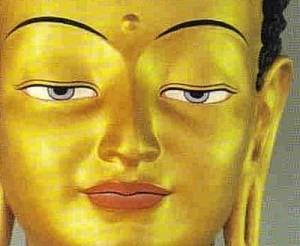An excerpt from a teaching called Perception and Karma by Jetsunma Ahkon Lhamo, July 19, 1989
In a previous teaching we talked about the six realms of cyclic existence and how they would see a cup of water. How would the Buddha see a cup of water? The Buddha would know it’s innate nature. The Buddha would know innate nature. In that awareness there is no thirst, there is no need. There is relaxation, space, and freedom from desire. Even though the Buddha might live in a life where he drinks water, there is spaciousness in that experience, because he knows the nature. He knows the nature of desire and of thirst. He knows the nature of the experience itself. He knows the nature of the thought, “I should drink now.” In the heart of every piece of phenomena, and every single experience of any kind, is that profound nature, completely unified, completely inseparable, the same. Even to say that in the heart of that experience is that nature isn’t true. It implies that you might think of it as being like one of those chocolate covered cherries. In the heart is the nature, and the rest of it is something else. It’s not. That’s the only way we have to describe it. This that I call a cup of water is emptiness. It is emptiness. The water, the glass, the color, the taste, the desire, the need, the experience, everything is emptiness. Knowing that nature, experiencing the relaxation and spaciousness as the Buddha experiences each experience has as its core unlimited supreme bliss, bliss that is united with compassionate activity.
I am not a Buddha therefore I cannot speak as one, but a hypothetical difference may be this: I’m going to drink this because my mouth is getting dry. My mouth is getting dry because I believe in self-nature as being inherently real. My mouth can be satisfied by this water because I believe this water is other. I’m taking a drink. The Buddha experiences the nature as a result of that awakening because the very nature of that awakening is perfect compassion. The Buddha appears in the world and takes a drink of water. Within the experience of this cup, within the experience of this water, in this experience of the movement, in the experience of the decision to take the water, within the experience of being here, is the heart of emptiness and at the core, each experience is bliss. The Buddha experiences that because he knows the nature and has awakened to that nature to the extent that there is no self-craving. Therefore each experience is potentially, though it may look ordinary to you and I, potentially the experience of the primordial view, as pure, as blissful, as luminous, as inseparable from that nature in ways that we cannot understand. Yet the Buddha did come to the earth and did drink water. I assume, I wasn’t there, but I assume he did.
We, however, continue to suffer because we don’t have that space. Our minds are not relaxed. We are constantly engaged in the rigidity of reinforcing self and other and constantly at the mercy of the compulsion of our karma and constantly at the mercy of our own automatic habitual tendency to exaggerate and continue to build more suffering.
The moral of the story is, be a Buddha now. Ask me how. That is a joke, of course, but if you follow the Buddha’s teachings you are changing. You are constantly changing in the only way change is meaningful. If you really use the techniques deeply, in a contemplative way, really thinking about this, then there is hope. If you sincerely think in the ways that I’ve instructed and do the practices that you are given, you will begin to transform your awareness into the pristine, primordial experience, which is your true nature. You will have a taste of that nature and that taste will surely grow.
Copyright © Jetsunma Ahkon Lhamo. All rights reserved











